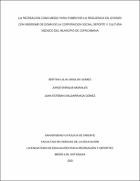Please use this identifier to cite or link to this item:
https://repositorio.uco.edu.co/jspui/handle/20.500.13064/682Full metadata record
| DC Field | Value | Language |
|---|---|---|
| dc.rights.license | http://creativecommons.org/licenses/by/3.0/ | - |
| dc.contributor.advisor | Manzanares-Niño, Miguel Angel | spa |
| dc.contributor.author | Giraldo-Gómez, Bertha Lilia | spa |
| dc.contributor.author | Morales, Jorge Enrique | spa |
| dc.contributor.author | Saldarriaga-Gómez, Juan Esteban | spa |
| dc.coverage.spatial | Sudamérica, Colombia, Medellín, Antioquia | spa |
| dc.coverage.temporal | 2020 | es_ES |
| dc.date.accessioned | 2020-11-05T15:57:35Z | - |
| dc.date.available | 2020-11-05T15:57:35Z | - |
| dc.date.issued | 2020-11-03 | - |
| dc.identifier.uri | https://repositorio.uco.edu.co/handle/20.500.13064/682 | |
| dc.description.abstract | En una sociedad como la actual, donde prima la competencia, muchos de los individuos con características especiales pueden ser injustamente discriminados y rezagados, ya que no son tratados con el debido interés que se merecen, siendo sesgados desde el mismo sistema educativo y mucho peor, no tienen a su alcance el tratamiento acorde a sus necesidades, desde lo instrumental hasta el personal tratante que cumpla con un perfil verazmente capacitado. Este punto es primordial, para generar un compromiso de ayuda pedagógica y sensorial complementaria que conllevaría a la interiorización de habilidades y conceptos, que incrementarían una mejora en su autonomía, y por ende, en su independencia familiar, social y personal. Se observa en la población seleccionada para este informe investigativo, que los jóvenes con Síndrome de Down muestran deficiencias y limitaciones en su capacidad espacial, fisiológica y corporal, esto debido a la desinformación por parte de la comunidad, falta de esfuerzos conjuntos en su entorno para el trato debido de estas personas especiales, y la mala articulación con entes que podrían apoyar a este segmento social, en este último punto entra nuestra investigación como eje de debate para la solución del objetivo plasmado. | es_ES |
| dc.format.extent | 101 | es_ES |
| dc.format.mimetype | application/pdf | es_ES |
| dc.language.iso | spa | es_ES |
| dc.publisher | Universidad Católica de Oriente | es_ES |
| dc.relation | Trabajo de grados | es_ES |
| dc.rights | info:eu-repo/semantics/openAccess | spa |
| dc.rights.uri | http://creativecommons.org/licenses/by-nc-nd/2.5/co/ | * |
| dc.subject | Recreación | es_ES |
| dc.subject | Resiliencia | es_ES |
| dc.subject | Síndrome de Down | es_ES |
| dc.subject | Inclusión | es_ES |
| dc.subject | Didáctica | es_ES |
| dc.subject | Lúdica | es_ES |
| dc.title | La recreación como medio para fomentar la resiliencia en jóvenes con síndrome de down de la corporación social deporte y cultura NEDISCO del municipio de Copacabana | es_ES |
| dc.type | Bachelor thesis | es_ES |
| dc.description.abstractenglish | In a society like the current one, where competition prevails, many of the individuals with special characteristics can be unfairly discriminated and lagged, since they are not treated with the due interest they deserve, being biased from the same educational system and much worse, they do not have at their disposal the treatment according to their needs, from the instrumental to the treating staff that meets a truthfully trained profile. This point is essential, to generate a commitment of complementary pedagogical and sensorial help that would lead to the internalization of skills and concepts, which would increase an improvement in their autonomy, and therefore in their family, social and personal independence. It is observed in the population selected for this research report, that young people with Down Syndrome show deficiencies and limitations in their spatial, physiological and body capacity, this due to disinformation by the community, lack of joint efforts in their environment to the due treatment of these special people, and the bad articulation with entities that could support this social segment, in this last point our research enters as the axis of debate for the solution of the stated objective. | es_ES |
| dc.subject.subjectenglish | Recreation | es_ES |
| dc.subject.subjectenglish | Resilience | es_ES |
| dc.subject.subjectenglish | Down Syndrome | es_ES |
| dc.subject.subjectenglish | Inclusion | es_ES |
| dc.subject.subjectenglish | Didactics | es_ES |
| dc.subject.subjectenglish | Leisure | es_ES |
| dc.subject.lemb | Resiliencia | es_ES |
| dc.subject.lemb | Psicología positiva | es_ES |
| dc.subject.lemb | Psicología social | es_ES |
| dc.subject.lemb | Calidad de vida | es_ES |
| dc.subject.lemb | Medicina deportiva | es_ES |
| dc.type.hasversion | info:eu-repo/semantics/acceptedVersion | es_ES |
| dc.audience | Interés General | spa |
| dc.rights.accessrights | Open Access | spa |
| dc.rights.spa | Acceso abierto | spa |
| dc.rights.cc | Atribución-NoComercial-SinDerivadas 2.5 Colombia | * |
| dc.publisher.department | Ciencias de la educación | es_ES |
| dc.publisher.program | Licenciatura en educación física recreación y deportes | es_ES |
| dc.contributor.corpauthor | Universidad Católica de Oriente. Facultad de ciencias de la educación | es_ES |
| dc.identifier.bibliographicCitation | Giraldo Gómez, Bertha Lilia; Morales, Jorge Enrique; Saldarriaga Gómez, Juan Esteban. La recreación como medio para fomentar la resiliencia en jóvenes con síndrome de Down de la Corporación Social Deporte y Cultura Nedisco del municipio de Copacabana (Trabajo de grado) Medellín, Antioquia; 2020. 101p. | es_ES |
| dc.type.driver | info:eu-repo/semantics/report | spa |
| dc.type.coar | http://purl.org/coar/resource_type/c_46ec | spa |
| dc.type.redcol | https://purl.org/redcol/resource_type/TP | spa |
| dc.type.local | Tesis/Trabajo de grado - Monografía – Especialización | spa |
| Appears in Collections: | Licenciatura en Educación física, recreación y deportes | |
Files in This Item:
| File | Description | Size | Format | |
|---|---|---|---|---|
| Documento Tesis de Grado.pdf | Documento Tesis de grado | 999.53 kB | Adobe PDF |  View/Open |
| Autorización depósito Repositorio Institucional.pdf Until 2050-12-31 | Autorización depósito repositorio institucional | 281.15 kB | Adobe PDF | View/Open Request a copy |
This item is licensed under a Creative Commons License

